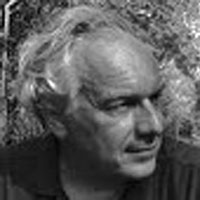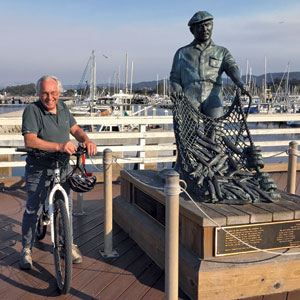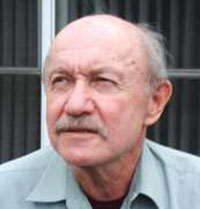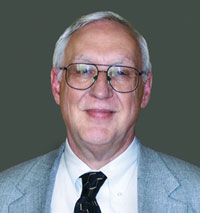|
Obituaries of Three OES Colleagues |
Obituary of Professor Jean-Pierre Hermand James V Candy, Patricia Candy,
Besides his own field research projects, he has been involved in a variety of campaigns in the Mediterranean, Australia, West Africa and Latin America dealing with marine ecology, fisheries, sediment transport and cultural heritage. Over the course of his career, he has served as Chief Scientist on over thirty scientific cruises. He is also the author of over 250 publications and co-editor of two books. Professor Hermand has served on scientific and technical committees for the ASA, the IEEE OES, the European Optical Society, the European Conferences on Underwater Acoustics, the International Conferences on Theoretical and Computational Acoustics, the Pacific Rim Underwater Acoustics Conference and the Underwater Acoustics Conferences and Exhibitions, where he has co-organized structured sessions. As a friend, “JP” was always joyful and supportive. The glimmer in his eyes and his mischievous smile could easily illuminate a room and bring great joy to those around him. If he could have traveled at the speed-of-light he would have, but instead he took his special bicycle everywhere. Jean-Pierre will be sorely missed by many. He departs this world, but will always remain in our hearts! Obituary of Dr. Edmund J. Sullivan James V Candy
Dr. Edmund Sullivan received all of his degrees from the University of Rhode Island with a Bachelor’s in Science in Electrical Engineering in 1965, a master’s degree in Electrical Engineering in 1967 and a Ph.D. in Physics in 1970. He was truly an “oceanic signal processor” possessing a deep knowledge and understanding of both ocean dynamics and processing techniques. Most known for his work on passive synthetic aperture towed array processing culminating in his recent textbook entitled Model-Based: Processing for Underwater Acoustic Arrays (Springer Briefs in Physics, ASA Press, 2015). Dr. Sullivan’s contributions to acoustics might be considered somewhat of an anomaly at first glance. Ed had a wealth of technical publications and awards in acoustics. He was well-known in the underwater acoustics community as an array designer, acoustics modeler, torpedo analyst/designer, tracking algorithm specialist, educator, advisor, mentor and father of the modern passive synthetic aperture processor. Perhaps all of these contributions can be surmised in one catchall identifier—Ed was a “model-based signal processor” combining his knowledge of the underlying acoustic phenomenology with oceanic measurements to create a model-based processor. Ed’s career was international, most notably evolving first as a staff scientist for the Physics and Technology Division at the Naval Undersea Warfare Center (NUWC), then next as leader of the Signal Processing Group at the SACLANT Undersea Research Centre in La Spezia Italy until 1988 returning again to NUWC. Technically, Dr. Sullivan published a wealth of papers and was extremely well-known in acoustic signal processing. In recognition of his achievements and contributions to model-based acoustic array signal processing, he was elevated to the grade of Fellow of both the Acoustical Society of America and the IEEE (Oceanic Engineering Society), a rare distinction. He received NUWC “Excellence in Science” Award, both in 1978 and 1991. Further honors followed with the IEEE Distinguished Technical Achievement award in 1994 and the inaugural Acoustical Society of America’s Silver Medal for Signal Processing in Acoustics in 2010. Ed Sullivan was a wonderful scientist, a man of high integrity and a great friend and colleague. He will be greatly missed! Obituary of Dr. John E. Ehrenberg Tracey Steig
John Ehrenberg, age 74, passed away at home on September 27, 2018 after a short but robust struggle with pancreatic cancer. John was born in Spokane, worked most of his adult life in Seattle and returned to live part-time in eastern Washington in 2001. He rebuilt a cabin in his much loved Methow Valley, enjoyed skiing and hiking and had a keen and grateful appreciation for the Methow Valley Chamber Music Festival. He enjoyed sailing, was an avid traveler for business and pleasure and a brilliant finish carpenter. John loved his friends and nieces and nephews who were a wonderful support for him during his illness. He was a devoted and loving husband to his wife of 51 years Kathleen, father to his daughter Shannon and his son David, and grandfather to Riley. Beginning at the University of Washington in the 1970’s and continuing over the past 45 years, Dr Ehrenberg did seminal work in the advancement of fisheries acoustic research. In 2016 he was awarded the IEEE Oceanic Engineering Society (OES) Distinguished Technical Achievement Award for the invention of the dual beam and split-beam scientific echo sounders and for contributions to the use of miniature acoustic tags in fisheries and predation research. Dr. Ehrenberg received his PhD in Electrical Engineering from the University of Washington in 1973, his MS in Electrical Engineering from the Massachusetts Institute of Technology in 1968 and his BS in EE from Seattle University. From 1973 to 1983 John was Research Faculty and Principal Engineer at the University of Washington Applied Physics Research Lab and went on to become a Research Professor in Electrical Engineering at the UW and then an Affiliate Faculty member at the University. Dr. Ehrenberg’s students and younger colleagues continue to do stellar research in echo statistics. From 1989 to 2007 Ehrenberg was Director and then acting Vice President of Information Electronics and Avionics Technology for Boeing Phantom Works. He directed research and development on advanced modulation and coding techniques for digital communications systems, adaptive processing algorithms and custom architectures for high speed signal processing. John was impressed by and grateful for the brilliance of the scientists and support staff he worked with while at Boeing. In 1989 Dr. Ehrenberg was brought on by the founding partners of the hydroacoustic consulting firm Hydroacoustic Technology Inc. to develop an engineering and manufacturing division. From 2007 until 2016 John Ehrenberg was President of HTI as they pioneered new techniques in fish assessment throughout the Pacific Northwest and the world. Using acoustic principles, John pioneered chirp signal processing and matched filter technology in the design of off-the-shelf echosounders available from HTI since 1992. From 2016 until the present Dr. Ehrenberg has been Chief Scientist of HTI-Vemco USA. The company has given many young engineers and fishery biologists the opportunity to work for the protection of our resources and the environment. John, the grandson of Swedish immigrants who came here on their own as teenagers, worked all his adult life to insure everyone had the same opportunities his family did. (In the 1960’s he joined the already decades long struggle for open housing in Seattle. In the 1970’s John joined the campaign against Initiative 13; marched in the first AIDS Walk in 1986; and campaigned for Gay Rights for the rest of his life. Most recently he joined the struggle against the inhumane treatment of immigrant children and worked to protect the civil rights of his Muslim students and their families.) John was a happy man. He led a good life. At John’s request, there will not be a funeral. In early June of 2019 a celebration of John’s life will be held in the Methow Valley. If you would like to make a gift in John’s memory, you may contribute to the Ehrenberg Endowed Scholarship in Electrical Engineering, University of Washington Foundation, College of Engineering, 371 Loew hall, Box 352180, Seattle, WA 98195. “We shall not cease from exploration, and the end of all our exploring will be to arrive where we started and know the place for the first time.” T.S.Elliot. |
||||||
|
If you would
like to contact the IEEE Webmaster |
|
 We have lost three OES colleagues in September 2018. Jean-Pierre Hermand, Edmund Sullivan and
We have lost three OES colleagues in September 2018. Jean-Pierre Hermand, Edmund Sullivan and 

